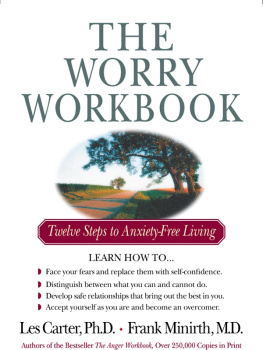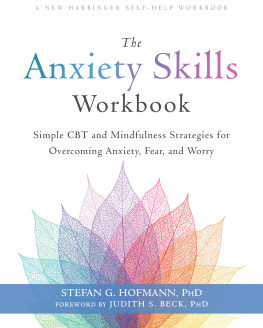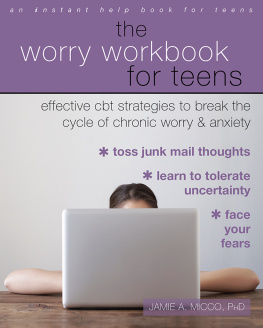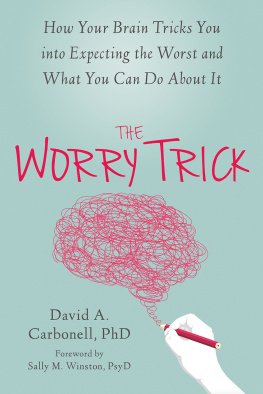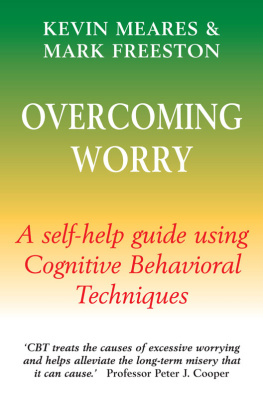Dr Kevin Meares is a consultant clinical psychologist and an accredited cognitive behavioural therapist. He works for the Northumberland, Tyne and Wear NHS Foundation Trust at the Newcastle Cognitive and Behavioural Therapy Centre. He offers therapy to adults with a range of complex psychological problems, specializing in anxiety disorders, and has a particular interest and expertise in the assessment and treatment of post-traumatic stress disorder. He is an experienced supervisor and trainer and he regularly leads workshops on CBT. His research interests focus on rumination and worry.
Professor Mark Freeston is the Head of Research and Development at the Newcastle Cognitive and Behavioural Therapies Centre where he was director of the Newcastle Diploma in Cognitive Therapy for ten years until 2010. He is also Professor of Clinical Psychology at the University of Newcastle. He divides his time between NHS duties and the University of Newcastle. He has published over a hundred scientific articles, mainly in the field of intrusive thoughts and worry and on the formulation and treatment of Obsessive Compulsive Disorder and Generalised Anxiety Disorder. He regularly provides workshops on the cognitive behavioural treatment of these disorders. His current research investigates intolerance of uncertainty, how it manifests in everyday life, how it may help to inform the treatment of problems like Obsessive Compulsive Disorder and Generalised Anxiety Disorder, and how it may help us understand anxiety among children and adolescents with autism spectrum disorders.
The aim of the Overcoming series is to enable people with a range of common problems and disorders to take control of their own recovery programme.
Each title, with its specially tailored programme, is devised by a practising clinician using the latest techniques of cognitive behavioural therapy techniques which have been shown to be highly effective in changing the way patients think about themselves and their problems.
The series was initiated in 1993 by Peter Cooper, Professor of Psychology at Reading University and Research Fellow at the University of Cambridge in the UK, whose original volume on overcoming bulimia nervosa and binge-eating continues to help many people in the USA, the UK and Europe. Many books in the Overcoming series are recommended by the UK Department of Health under the Books on Prescription scheme.
Other titles in the series include:
OVERCOMING ANGER AND IRRITABILITY
OVERCOMING ANOREXIA NERVOSA
OVERCOMING ANXIETY
BULIMIA NERVOSA AND BINGE-EATING
OVERCOMING CHILDHOOD TRAUMA
OVERCOMING CHRONIC FATIGUE
OVERCOMING CHRONIC PAIN
OVERCOMING COMPULSIVE GAMBLING
OVERCOMING DEPERSONALIZATON AND FEELINGS OF UNREALITY
OVERCOMING DEPRESSION
OVERCOMING GRIEF
OVERCOMING INSOMNIA AND SLEEP PROBLEMS
OVERCOMING LOW SELF-ESTEEM
OVERCOMING MOOD SWINGS
OVERCOMING OBSESSIVE COMPULSIVE DISORDER
OVERCOMING PANIC
OVERCOMING PARANOID AND SUSPICIOUS THOUGHTS
OVERCOMING PROBLEM DRINKING
OVERCOMING RELATIONSHIP PROBLEMS
OVERCOMING SEXUAL PROBLEMS
OVERCOMING SOCIAL ANXIETY AND SHYNESS
OVERCOMING TRAUMATIC STRESS
OVERCOMING WEIGHT PROBLEMS
OVERCOMING YOUR CHILDS FEARS AND WORRIES
OVERCOMING YOUR CHILDS SHYNESS AND SOCIAL ANXIETY
OVERCOMING YOUR SMOKING HABIT
www.overcoming.co.uk
OVERCOMING WORRY AND GENERALISED ANXIETY DISORDER
A self-help guide to using Cognitive Behavioural Techniques
Kevin Meares
and
Mark Freeston

ROBINSON
First published in Great Britain in 2008 by Robinson
an imprint of Constable & Robinson Ltd.
This revised and updated edition published in 2015 by Robinson
Copyright Kevin Meares and Mark Freeston, 2008, 2015
The moral right of the authors has been asserted.
All rights reserved.
No part of this publication may be reproduced, stored in a retrieval system, or transmitted, in any form, or by any means, without the prior permission in writing of the publisher, nor be otherwise circulated in any form of binding or cover other than that in which it is published and without a similar condition including this condition being imposed on the subsequent purchaser.
A CIP catalogue record for this book
is available from the British Library.
ISBN 978-1-47210-742-8 (paperback)
ISBN: 978-1-47211-394-8 (ebook)
Robinson
is an imprint of
Constable & Robinson Ltd
100 Victoria Embankment
London EC4Y 0DY
An Hachette UK Company
www.hachette.co.uk
www.constablerobinson.com
Contents
Acknowledgements
to the First Edition
We owe an incalculable debt of gratitude to the individuals we encountered in our clinical work who suffered with excessive worry; their collective experience is the principal source for this book. As this is a self-help book we have limited the number of references to research but acknowledge that the information is based on the silent yet generous contribution of many. We would like to thank all of those who have contributed to the pool of knowledge from which we have drawn. With this in mind we would like to thank all those who contributed to the programme of research at lUniversit Laval, leading to the development of the model of Generalised Anxiety Disorder that forms the foundation for this book. We would especially like to thank Robert Ladouceur, Michel Dugas and Eliane Lger.
We thank all our colleagues at the Newcastle Cognitive and Behavioural Therapy Centre for their good humour, support and friendship, with special thanks to Dr Stephen Barton, for his generosity with both his time and his ideas, particularly related to the chapter on the heart of worry and on goal setting. Many thanks also to Dr Andrew Wilkinson, Dr Tracy Thorne, Dr Douglas Maisey, Jenny Shannon, Emma Thomas, Carol Thackery and Dr Jen Lane for their helpful feedback on early drafts. Thanks to Peter Armstrong for many helpful discussions. Thanks to Karen Lysakowska, Anita Allinson, Jo Thomas and Jon Chapman for their contributions. In addition, we thank the numerous supervisors, supervisees, trainees and students who have contributed along the way.
Finally, we thank our families and friends for putting up with the absences, both physical and mental, the long hours, the late nights and the inevitable worry, both real and hypothetical.
Acknowledgements
to the Second Edition
Since writing the first book there are a number of people who have helped develop our ideas and who have encouraged us to write the second edition. First, thanks to all the people who have provided formal or informal feedback on the first edition and told us what they like about it and where it could be improved. Second, there are people who have contributed in various ways to the development of the ideas. There are colleagues, both clinical and academic, who have questioned, challenged and stretched our understanding and the model, including Dr Andrew Wilkinson, Dr Jacqui Rodgers, Professor Sue Leekam, Theresa Marrinan, Dr Gioia Bottesi, Dr Nick Carleton, Dr Sean Perrin. Numerous students at Newcastle University both postgraduate and undergraduate have revisited, reviewed, critiqued and investigated specific aspects of our understanding of both worry and intolerance of uncertainty and, most importantly, brought in new perspectives and original ideas. Once again our colleagues have been supportive, with a special mention for Dr Vivien Twaddle. Finally, we would like to thank our families again for recognizing that this is an important part of what we do and for supporting us to do it.
Next page

